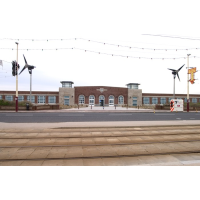Solaris Centre leads the way in sustainability

A derelict 1938 Art Deco promenade solarium in Blackpool has been transformed into a new centre of excellence in environmental sustainability, called the Solaris Centre.
It will provide Lancaster Environment Centre with a satellite unit that aims to become the leading centre for sustainability in the North West. The building, on Blackpool’s South Shore Promenade, has been designed to encourage and promote environmental excellence and sustainability throughout the region and beyond.
Solaris is a joint partnership between Lancaster University and Blackpool Borough Council, and the building and its activities will fulfil several different and important objectives, many of which lie at the heart of the North West Regional Economic Strategy.
Steve Riches, Director of the Knowledge Business Centre within Infolab 21, who played a key role in the development of Solaris, said: “This is really a showpiece that Lancaster University is proud to be part of.”
The centre will provide managed workspace for local business incubation that specialise in environmental activities. Businesses will have access to the largest concentration of environmental research and training in Europe, via the outreach arm of Lancaster Environment Centre.
Dr Mark Bacon, Director of Enterprise and Business Partnerships within the Environment Centre, who’s team developed material for the visitor’s centre said: “I am really pleased with what we have been able to achieve by working together with our colleagues at Blackpool Borough Council and an icon to Lancaster’s commitment to play a leading role in the economic development of Lancashire.”
In-house consultants will provide information about waste, recycling and energy efficiency. The aim is to create a stronger and more prosperous local economy that can provide secure and fulfilling training opportunities for all.
Tourism will also be key. Developing and communicating a sustainable culture of ‘green tourism’ by balancing the needs of tourism with the management of a sensitive coastal environment forms an integral element of the centre’s strategy. This will be realised through projects delivering targeted environmental support to companies within the local tourism industry.
Exhibition areas proved an exciting visual learning experience, promoting local action to address global concerns. Displays encourage visitors to act responsibly by demonstrating how the combination of individual actions at a community level can significantly impact on issues such as climate change, depletion of natural resources and the threat to biodiversity.
In designing the building, partners were keen to maintain the Art Deco period character of the solarium while ensuring that designs were consistent with the Government’s ‘Better Public Buildings’ initiative. Sustainable and environmentally sound techniques were used – materials from the original building and reclaimed and recycled materials were all incorporated into the construction.
Solaris will be the first net zero energy building in the region, thanks to its wind turbines and photovoltaic cells along the roof. During periods of overproduction, energy will be exported to the National Grid. Water in the building will be recycled.